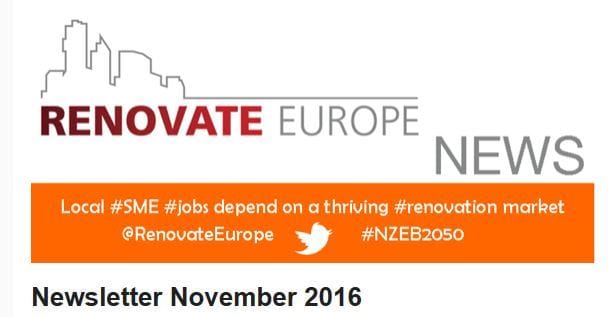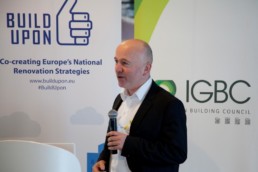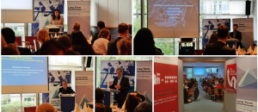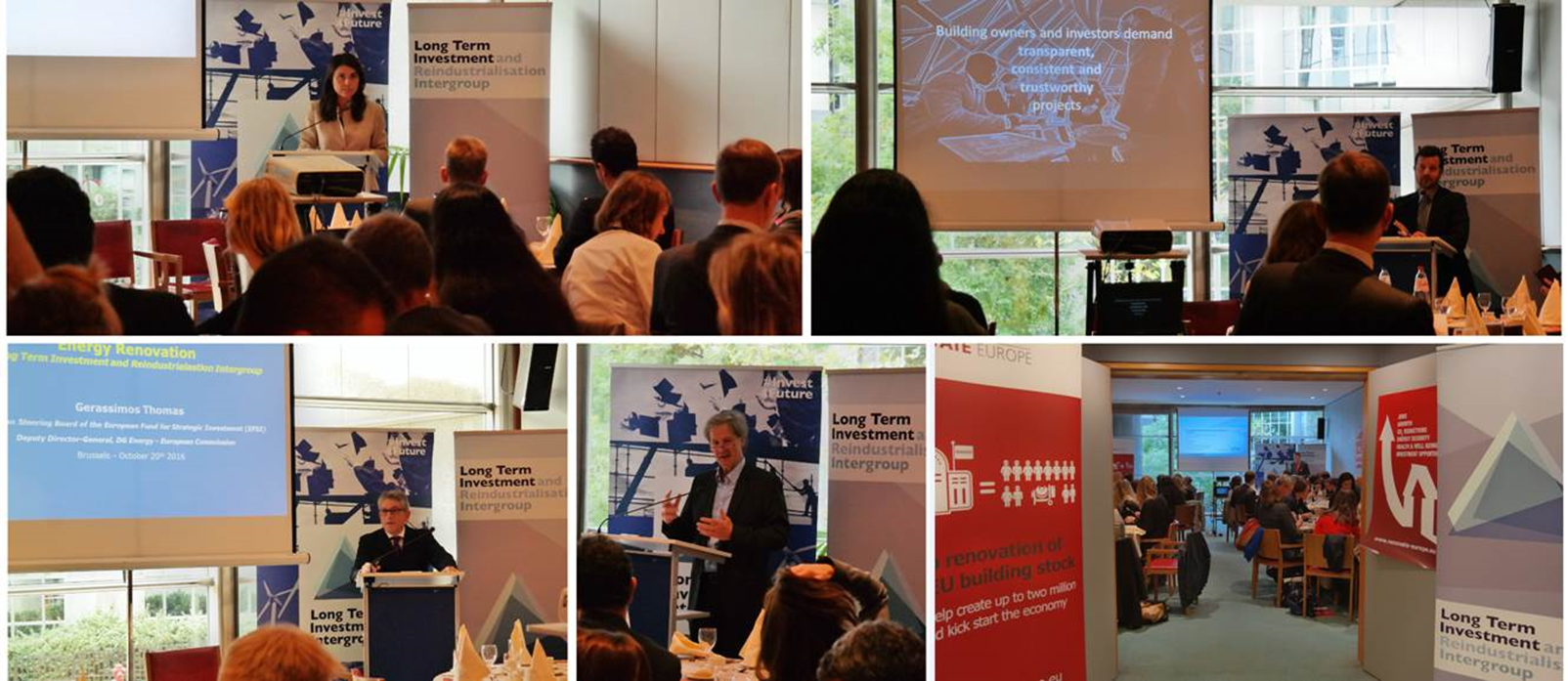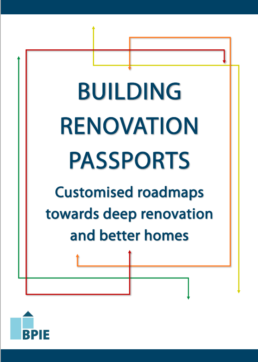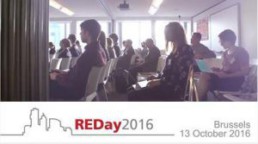Renovate Europe Newsletter - 03/2016
The Renovate Europe Newsletter 03/2016 is out!
Read all the news: http://us13.campaign-archive1.com/?u=19fcf559c532930060e01ebca&id=eac63f019d&e=5bc703176d
Renovate Europe Letter to President and Commissioners
Renovate Europe sent letters to President Juncker and each of the Commissioners highlighting the direct impact that next week's Energy Union 'Winter Package' will have on the energy renovation market, and in turn on citizens and businesses across the EU. Enclosed with the letter are the 26 postcards with photo of 26 different MEPs explaining why they want to see stronger action on buildings in EU policy. These MEPs are from 4 different parties and 15 different countries, demonstrating the cross-party and cross-country support for massive energy renovation in the EU.
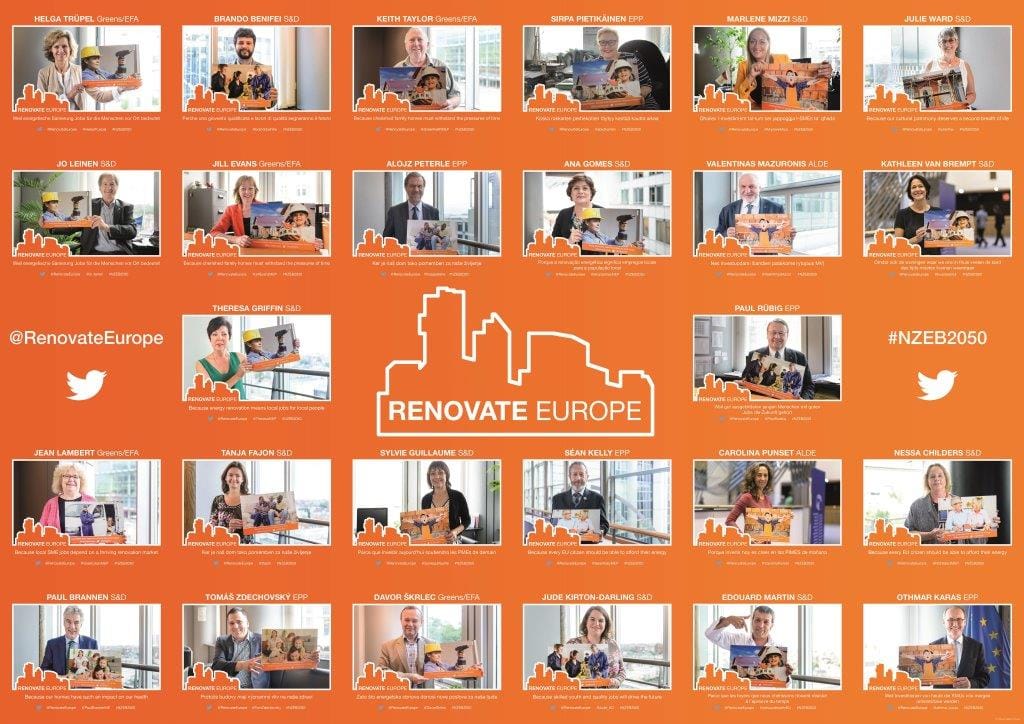
Interview with IGBC
INTERVIEW WITH PAT BARRY, CEO OF THE IRISH GREEN BUILDING COUNCIL (IGBC)
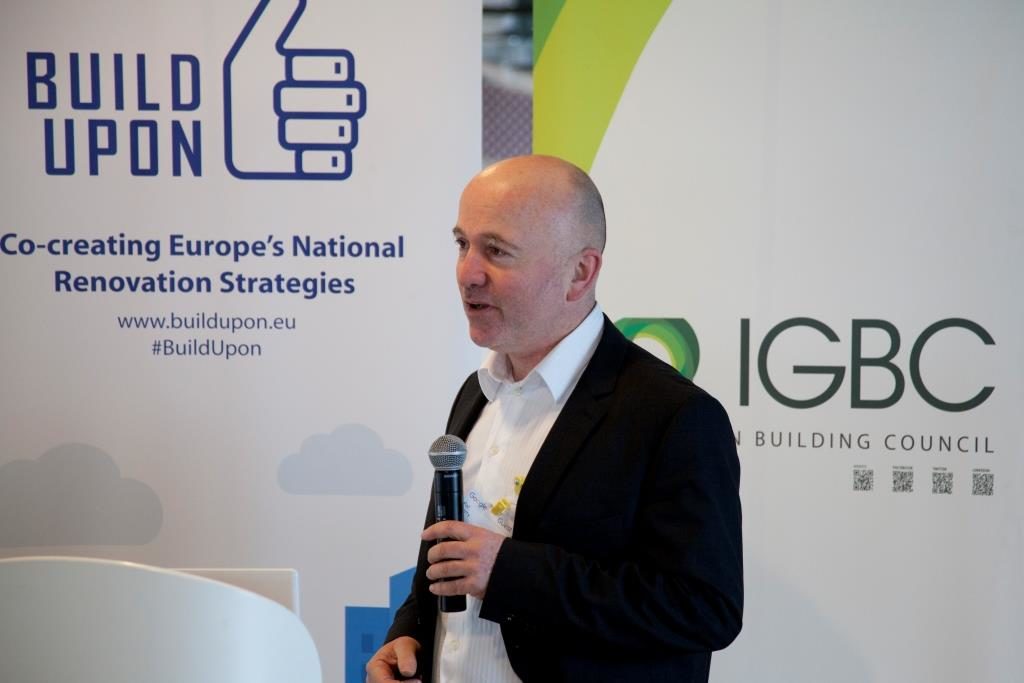
Why did the IGBC join the Renovate Europe Campaign?
The IGBC is the leading authority on sustainable building in Ireland. With a network of over 90 member organisations from the entire value chain of the built environment, the IGBC is working to transform the Irish construction and property sector into a global leader in quality and sustainability.
More specifically, since 2015, the IGBC has been working to build a community of experts and stakeholders to develop the V2.0 National Renovation Strategy that Ireland must deliver by April 2017 under the Energy Efficiency Directive. This work, conducted as part of the H2020 funded Build Upon project, led to the publication of a Declaration in 10 Points for a Better National Renovation Strategy.
Key stakeholders involved in the consultation process have consistently called for political leadership in this area. Furthermore, we believe that the scale of the challenge ahead is enormous and that our impact can be much bigger if we work together with other European organisations sharing similar objectives. For all these reasons, we are delighted to join the Renovate Europe Campaign.
How does the IGBC intend to contribute to the success of the Renovate Europe Campaign?
Through Ireland’s National Renovation Strategy V.2 Consultation process, the IGBC has built a diverse community of over 150 stakeholders and experts in deep renovation. Case studies were developed, large workshops were run and considerable knowledge of the topic was gained. The IGBC team recently presented the Declaration in 10 Points for a Better National Renovation Strategy to the Irish Minister for Communications, Climate Action and Environment, Denis Naughten T.D.
Over the next months and years, the IGBC will continue to build this network, not only to co-design an ambitious national renovation strategy, but also to ensure it is implemented successfully and Ireland’s building stock is renovated at a faster rate.
Thanks to this network and expertise, we believe that we are well placed to input into Renovate Europe Campaigns and to relay them in Ireland.
What are your expectations and how would you like to see the Renovate Europe Campaign develop in the future?
Over the last 18 months, the IGBC has been working to build a community of stakeholders and experts in deep renovation. We are now hoping to present a final set of recommendations on large scale deep renovation to Minister Naughten by the end of February 2017. In parallel, the IGBC is working on various spin-off projects that could potentially increase the rate of deep renovation in Ireland (e.g. introducing building performance leasing).
However, we believe that political leadership is needed and that the Renovate Europe Campaign can significantly help us in raising deep renovation awareness among politicians and decision-makers. Joining an EU-wide campaign such as Renovate Europe is also a fantastic opportunity to learn from other member states. The scale of the challenge is such that cooperation and joint action at EU level is more than ever required.
Lunchtime Debate: Energy Renovation - A Long-term Viable Investment for the EU
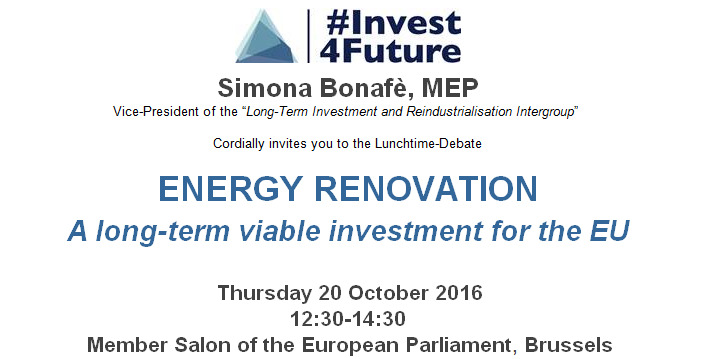 Long-term investments are particularly important for the construction sector, which represents more than 9% of the EU GDP, of which 92% are micro-enterprises, and generates about 18 million jobs. Setting a long-term investment framework for the energy renovation market goes hand-in-hand with establishing a long-term regulatory vision, both of which are crucial for unlocking the huge economic potential in the building stock in the EU and delivering on the Energy Union goals. Grasping the opportunities from the upcoming revisions of the EU’s main buildings-related legislation this autumn (EPBD, EED) to achieve Nearly Zero Energy Building (NZEB) standards for the EU building stock by 2050 will lead to job creation, especially among local SMEs, healthy homes for our children, and reduced CO2 emissions, in addition to increasing property value and enabling the free flow of investment capital into the renovation market.
Long-term investments are particularly important for the construction sector, which represents more than 9% of the EU GDP, of which 92% are micro-enterprises, and generates about 18 million jobs. Setting a long-term investment framework for the energy renovation market goes hand-in-hand with establishing a long-term regulatory vision, both of which are crucial for unlocking the huge economic potential in the building stock in the EU and delivering on the Energy Union goals. Grasping the opportunities from the upcoming revisions of the EU’s main buildings-related legislation this autumn (EPBD, EED) to achieve Nearly Zero Energy Building (NZEB) standards for the EU building stock by 2050 will lead to job creation, especially among local SMEs, healthy homes for our children, and reduced CO2 emissions, in addition to increasing property value and enabling the free flow of investment capital into the renovation market.
Click on the relevant names to download the PPT presentations
Welcome Address: Simona BONAFE, MEP, Vice-Chair of Long-term Investment Intergroup
Keynote Speech: Gerassimos Thomas, Deputy Director-General for Energy, European Commission & Chairman of the EFSI Steering board
Roundtable
Moderator: Jo LEINEN, MEP
Tackling Standardization in order to stimulate Energy Efficiency Investment
Panama Bartholomy, Director, Investor Confidence Project Europe
Energy Efficiency Mortgage Project
Luca Bertalot, Secretary General of the European Mortgage Federation - European Covered Bond Council
The contribution of National Promotional Banks and Institutions
Markus Schönborn, Vice-President, Director Product Management Residential Housing, KfW Bankengruppe
Unlocking Investment for Smaller Energy Efficiency Projects
Jessica Stromback, Chair, Joule Assets Europe; Chair, Smart Energy Demand Coalition
Q&A
Closing remarks: Adrian JOYCE, Renovate Europe Campaign Director
DOWNLOAD THE SPEAKERS BIOGRAPHIES
Building Renovation Passports - Customised Roadmaps towards Deep Renovation and Better Homes
An overview of initiatives currently developed in France, Germany and Belgium, for building renovation passports, considered as Energy Performance Certificates 2.0, and perfect tools leading to better buildings performance and more comfortable homes.
In its most recent study, BPIE suggests to evolve EPCs into Building Renovation Passports. Based on three examples of “Building Renovation Passports” in the Belgian region of Flanders (“Woningpas”), France (“Passeport Efficacité Énergétique”) and Germany (“Individueller Sanierungsfahrplan”), building renovation passport are centred around the combination of technical on-site energy audits and quality criteria established in dialogue with building owners. The result is a user-friendly long-term roadmap that owners can use to plan deep renovations, gather all relevant building information in a sole place and get an up-to-date screenshot of the building across its lifetime, with information about comfort levels (air quality, better daylight entry, etc.) and potential access to finance.
The aim of this report is to provide an overview of initiatives currently developed: three of them were selected, in Flanders, France and Germany, all revolving around the concept of “building renovation roadmap or passport”. These initiatives were chosen for their advanced phase of development, as they provide a good overview of the process supporting the creation of a Building Renovation Passport and as they cover the main issues that need to be addressed for its development and implementation. In the three cases, public authorities have shown interest for this concept (France) and have supported or driven (Flanders and Germany) its development.
Section 1 explores the notion of “Building Renovation Passport”, introducing the concept, based on the three case studies. Section 2 presents the three main initiatives: a) the “individueller Sanierungsfahrplan” (individual renovation roadmap) in Germany, b) the Flemish “Woningpas” (Dwelling ID), and c) the “Passeport Efficacité Énergétique” (Energy efficiency passport) in France. Finally, section 3 outlines a series of recommendations for the introduction of building renovation passports across the EU.
Download the report here
REDay2016: Energy Renovation is the “people’s policy”
Renovate Europe held its sixth edition of Renovate Europe Day (REDay2016) on 13th October in Brussels, attended by over 100 participants and under the patronage of the Slovak Presidency of the EU, with a focus on how achieving an NZEB building stock by 2050 can boost EU jobs, growth and SMEs and increase benefits to EU citizens and businesses.
Ahead of the upcoming legislative proposals and on the back of the Paris agreement which relies on a significant scale-up of energy renovation in the EU, Renovate Europe Day highlighted how energy renovation is a topic which has a direct and tangible impact on EU citizens.
“Energy renovation is often dismissed as a technical topic, but it actually goes straight to the heart of every EU citizen. These are people’s homes, people’s hospitals, people’s schools we are talking about”, explained Adrian Joyce, Director of the Renovate Europe Campaign, “and these are people’s jobs and people’s SMEs that we are aiming to boost. We need a long-term vision of an NZEB building stock by 2050 in order to deliver on people’s expectations and improve their wellbeing”.
Legislation is the main driver for the renovation market, which needs a clear long-term vision to trigger investment. The revisions of the EPBD and EED offer the opportunity to enshrine a long-term vision in legislation, and to emphasize the need to prioritise the reduction of energy demand over decarbonisation, to ensure citizens reap the benefits. “Citizens will enjoy the benefits of a living in a highly energy efficient home because it will also be a healthy, comfortable home. A decarbonised leaky building will not deliver those benefits,” explained Adrian Joyce.
The motivation to achieve an NZEB building stock was clearly demonstrated at REDay2016 by first-hand contributions from four innovative models, already stimulating increased employment on the ground. Belgium’s RenoWATT set up a one-stop model including technical and financial support, motivated by the potential to maintain and/or create up to 16 000 jobs over the next 30 years if 60% of Wallonia’s buildings were to be renovated. Other examples included UK’s RetrofitWorks, based on a cooperative structure; an ESCO model in Croatia which undertook the deep renovation of an old hospital without disturbance to the patients; and France’s Picardie Pass Rénovation, whose tailored independent advice and financing solutions for owners has mobilised almost 650 local companies.
The European Parliament also showed its enthusiasm for applying EU legislation on a practical level in its own buildings (see Vice-President MEP Ulrike Lunacek’s video). The EP has called for achieving an NZEB building stock by 2050 in its recent Gierek and Pieper Reports.
The morning conference of REDay2016 was followed by visits of two renovation projects in the framework of the Bâtiment Exemplaires programme run by Bruxelles Environnement. Find out more about BatEx here.
#REDay2016 #NZEB2050 @RenovateEurope
Download the PPT presentations and more information about the event
END


